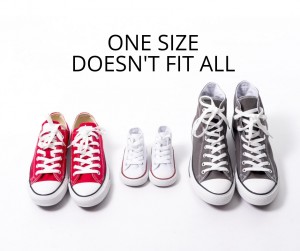Early in my career, I worked in a small startup. As the only writer in the company, I wrote nearly everything for the business, from data sheets and white papers to direct response ad copy, emails, user manuals (back when companies shipped printed manuals), and invitations to the holiday party.
In retrospect, I’m pretty confident that the ad copy stank. But hey, in a start-up, everyone wears a lot of hats.
I was the living expression of the One-Size-Fits-All Writing Myth—the idea that the person who can write well can tackle any writing project with equal success.
The One-Size-Fits-All Writing Myth
At first glance, this doesn’t seem like an unreasonable thought. If you write well, you should be able to undertake a wide variety of projects, right?
Sure, you can write – but can you write something effective?
The One-Size-Fits-All writer often underestimates the challenge of creating effective content for different purposes.
You wouldn’t ask your house painter to paint your portrait, would you?
Alright, you might if you happened to know that she is an accomplished artist. But you get my point: you cannot tell how the portrait will turn out by looking at the brushwork on the window trim.
Writing is at least as complicated and specialized as painting.
How This Myth Can Hurt You
This myth strikes in many places.
On the job: This myth is more pervasive in the workplace than you might imagine. I spoke with one writer who, on completing a LinkedIn ad campaign for a product, was asked to write the documentation for the same product – as if the one followed logically from the other.
Writing effective procedural instructions calls on one set of skills; writing ad copy that converts is an entirely different task.
Your personal writing: The successful poet may not write a passable thriller the first time out. Authors can cross genres, but shouldn’t take success for granted.
The danger lies in overlooking the differences in the audience needs or reader expectations as you change writing areas, or underestimating the learning curve involved in being successful.
The One-Size-Fits-All myth can set you up for failure.
But I don’t want to debunk it completely, because it has an upside.
A Little Myth Can Go a Long Way
We expand our skills by trying new things, with the faith that, with work, we can succeed. Sometimes, the belief that you can do something gives you the necessary impetus to learn and grow.
For example, let’s say you’re a strong writer, but have never written a book. A dash of belief that your writing skills are transferable may help you get started. You’ll learn as you go.
I’m grateful for my experience writing in the startup; I learned about multiple areas of the business, figuring out where my strengths lay and where I needed work. The environment was supportive.
You can make this myth work for you, if strike the right balance of optimism and realism.
Believe in your ability to grow as a writer.
Balancing Optimism and Learning
Here’s my best advice for protecting yourself from the dangers of unrealistic expectations while expanding your writing skill set.
Start with a growth mindset. Let’s say you’ve decided to write a script. Instead of thinking I’m not a scriptwriter, think I haven’t written a script yet, but I can learn how to do it.
Commit to learning. Read, watch videos, talk to other writers. You don’t have to become a master – just learn more than you know now, and work on improving with intention.
Set expectations – your own and those of others. In the workplace, if you’re asked to do something unfamiliar, let people know that there’s a learning curve. And if you’re setting out on your own to do something new, cut yourself a little slack while you learn.
How have you handled balancing this dilemma? Are you a “generalist” writer eager to try different things or a specialist? I’d love to hear your thoughts.
Related Reading
Writing and the Growth Mindset
Two Books to Build Your Writing Resilience
Look for more on the myths in the book The Workplace Writer’s Process
